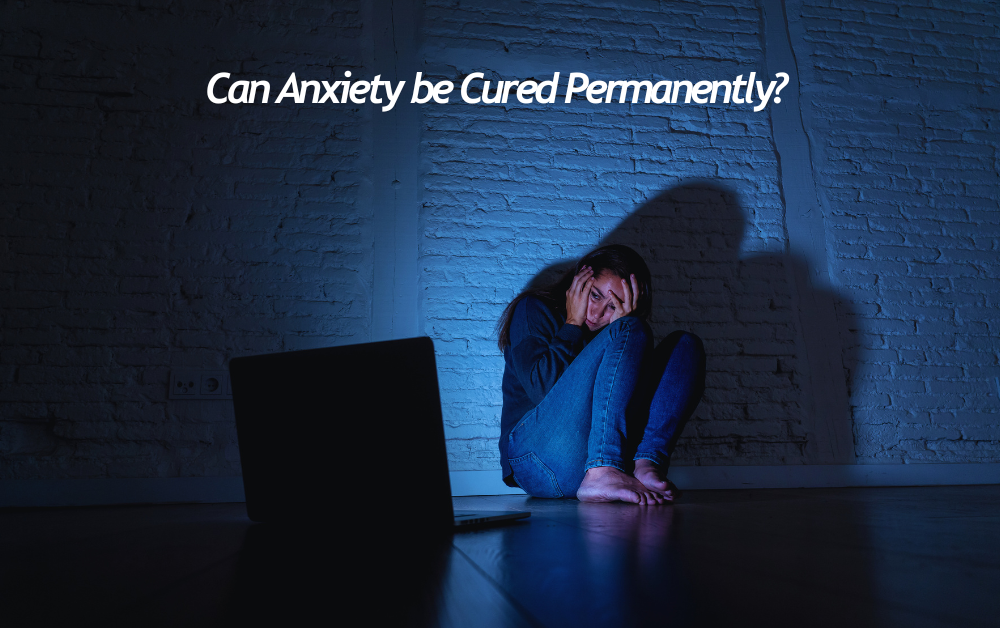Hi, Everyone. I am here with a question: Can Anxiety be Cured Permanently?Anxiety is a complex mental health condition, and whether Anxiety can be Cured Permanently depends on various factors, including the severity of the Anxiety, individual differences, and the specific type of anxiety disorder. Anxiety can often be effectively managed and treated, allowing individuals to live fulfilling lives.
If you suffer from anxiety, you may be able to manage it through lifestyle changes such as regular exercise, a nutritious diet, and adequate sleep. When an anxiety trigger or stressor passes, anxiety usually goes away, but severe or persistent anxiety might be a disorder. Anxiety disorders can be treated, and there are many options available.
Many treatment options and support options are available for Anxiety, though a permanent cure isn’t guaranteed. Getting help if you need it can help manage and alleviate anxiety symptoms.
Symptoms of Anxiety
Symptoms of anxiety can vary from person to person, and the way it appears can vary as well.
Physical Symptoms:
Tension in muscles: Aching muscles or feeling tense.
Fatigue: Feeling tired or having low energy.
Restlessness: Being unable to relax or feeling on edge.
Increased Heart Rate: Palpitations or a faster heartbeat.
Sweating: Experiencing excessive sweating, especially in stressful situations.
Cognitive Symptoms:
A feeling of uncontrollable worry: Uncontrollable thoughts about everyday issues.
Racing Thoughts: Thoughts that speed up and feel difficult to control.
Difficulty Concentrating: Trouble focusing on tasks or making decisions.
Anticipating the Worst: Expecting the worst-case scenario in various situations.
Emotional Symptoms:
Irritability: Feeling easily annoyed or agitated.
Fear: A sense of impending doom or danger without a clear cause.
Nervousness: Being jittery or on edge.
Feelings of restlessness: An inability to relax or sit still.
Behavioral Symptoms:
Avoidance: Steering precise situations that trigger Anxiety.
Compulsive Behaviors: Engaging in repetitive behaviors as a way to cope.
Procrastination: Delaying tasks due to Anxiety about the outcome.
Isolation: Withdrawing from social activities or relationships.
Sleep Disturbances:
Insomnia: Difficulty falling asleep or staying asleep.
Nightmares: Intense, anxiety-provoking dreams.
Gastrointestinal Issues:
Stomachaches: Upset stomach or gastrointestinal discomfort.
Nausea: Feeling queasy or having an upset stomach.
Anxiety symptoms can vary in intensity, and it is essential to recognize that everyone experiences anxiety differently. Furthermore, anxiety is an adaptive response to stress that is normal. It is, therefore, advisable to seek professional assistance if anxiety becomes overwhelming, persists, or significantly interferes with daily life, as this may indicate an anxiety disorder. The mental health professional can assist by assessing the symptoms and guiding appropriate interventions and treatments.
What Are Anxiety Disorders?
Anxiety disorders encompass a group of mental health conditions characterized by heightened levels of fear, worry, or Anxiety that significantly impact daily functioning. These disorders include:
Generalized Anxiety Disorder (GAD):
Marked by persistent and excessive worry about everyday activities and events.
Obsessive-Compulsive Disorder (OCD):
Involves unwanted, obsessive thoughts and compulsive behaviors performed to alleviate the Anxiety and distress triggered by those thoughts.
Panic Disorder:
Results in intense, unexpected episodes of panic or fear accompanied by symptoms like difficulty breathing, rapid heartbeat, sweating, trembling, and dizziness.
Phobia:
Phobias are intense, irrational fears of specific objects or situations. For instance, acrophobia is a fear of heights.
Post-Traumatic Stress Disorder (PTSD):
Arises in response to experiencing or witnessing a traumatic event, leading to intrusive thoughts, flashbacks, nightmares, and panic attacks.
Selective Mutism:
It often develops in childhood and involves the inability to speak in specific situations due to Anxiety, stress, embarrassment, or fear.
Social Anxiety Disorder (SAD):
Anxiety and worry in social situations, like public speaking.
Getting help with anxiety disorders is crucial because they can mess up your relationships, life, and well-being. Getting an accurate diagnosis, tailoring a treatment plan, and getting support from a mental health professional can help manage and alleviate anxiety disorders.
Managing Anxiety

Here are some approaches to managing and treating Anxiety:
Therapy:
Cognitive Behavioral Therapy (CBT) stands as a cornerstone in the treatment of Anxiety, employing a systematic approach to address and modify negative thought patterns and behaviors. CBT operates on the premise that our thoughts influence our feelings and actions, aiming to identify and reframe distorted thinking patterns. Therapists work collaboratively with individuals to develop coping strategies, encouraging a more adaptive mindset and reducing Anxiety.
Exposure Therapy is another powerful intervention, particularly effective in treating phobias and certain anxiety disorders. Through controlled and gradual exposure to feared situations or stimuli, individuals confront their anxieties in a safe therapeutic setting. This process helps desensitize emotional responses, promoting a recalibration of fear responses over time. By systematically facing and overcoming these fears, individuals gain mastery over their Anxiety, leading to increased confidence and a diminished overall anxiety response. CBT and Exposure Therapy offer valuable tools for individuals to steer and manage Anxiety, encouraging lasting positive change in thought processes and emotional well-being.
Medication:
Most anxiety disorders are treated with medication, specifically selective serotonin reuptake inhibitors (SSRIs) and benzodiazepines. SSRIs increase the availability of serotonin, a neurotransmitter associated with mood regulation, while benzodiazepines act as sedatives to calm the nervous system. Anxiety cannot be eradicated permanently, but it can be managed.
In individuals dealing with anxiety, these medications can effectively alleviate symptoms and provide relief.Nevertheless, medications alone aren’t a long-term solution.
Some medications can help manage acute symptoms, but a holistic approach usually includes coping strategies, lifestyle changes, and psychotherapy. To figure out how effective the medication is and adjust it accordingly, healthcare professionals need to monitor it regularly. Anger and mental well-being will be addressed through a detailed toolkit.
Lifestyle Changes:
Incorporating positive lifestyle changes and mindfulness practices can be instrumental in advancing mental well-being and alleviating Anxiety. As well as improving physical health, regular exercise releases endorphins, the body’s natural mood lifters. Individuals can cope with stress and anxiety by eating a healthy diet of nutrients, vitamins, and minerals.
Mindfulness and relaxation techniques offer powerful tools to manage anxious thoughts and promote a sense of calm. Meditation encourages focused attention and heightened self-awareness, while deep breathing exercises help regulate the nervous system, reducing the physiological symptoms of Anxiety. Progressive muscle relaxation involves systematically tensing and releasing muscle groups, promoting physical and mental relaxation. Integrating these practices into one’s daily routine cultivates a holistic approach to anxiety management, advancing resilience and enhancing overall mental and emotional well-being.
Support Groups:
Connecting with others who intimately understand the nuances of Anxiety can reduce feelings of isolation and provide a sense of belonging. Participants gain valuable insights into various coping mechanisms and resilience strategies through shared stories and empathetic interactions. Moreover, the non-judgmental atmosphere of support groups cultivates a safe space for individuals to express their emotions openly.
Also, support groups are great for providing practical advice and resources so that participants can learn about treatments, self-help methods, and emotional support. Those with anxiety disorders benefit greatly from these groups because they encourage a sense of camaraderie and understanding. To encourage a sense of community and understanding, individuals who suffer from anxiety disorders benefit from support groups. For individuals to share their experiences, thoughts, and coping strategies, it is essential to create a supportive environment in these groups.
Mindful Respiration Mastery:
Hone the art of mindful breathing, placing hands strategically to synchronize diaphragmatic expansion. Inhale tranquility with essential oils like sweet orange or ylang-ylang, guiding a serene journey through your central nervous system.
Aromatic Alleviation:
Tackle the power of essential oils—sweet orange, ylang-ylang, or grapefruit—to weave a tapestry of anti-anxiety enchantment. Infuse your space through cosmetic applications or a diffuser, sculpting an ambiance that whispers serenity.
Nutritional Harmony:
Tour the intricate dance between your diet and Anxiety, where gut bacteria choreograph brain responses. Nourish your gut flora for a symphony that harmonizes with resilience in the face of fear.
Caffeine Consciousness:
Steer the realm of anxiety triggers by elegantly reducing the caffeine cadence. Uncover the subtle nuances of your anxiety landscape through a gradual waltz of decreased caffeine indulgence.
Nature’s Embrace:
Immerse yourself in nature’s embrace to orchestrate a melodic reduction in Anxiety. Let outdoor escapades choreograph a ballet that calms cortisol crescendos and soothes the rhythm of your sympathetic nervous system.
Endorphin Expedition:
Cultivate serenity with yogic breathing and meditation, where pranayama orchestrates the harmony of the nervous system. Light up the path with online guides or savor the camaraderie of in-person sanctuaries.
Bathing in Tranquility:
Immerse yourself in the tranquil waters of a warm bath, activating the parasympathetic dance that silences the anxiety-laden overture. Allow the waters to cradle you, a remedy for the fight-or-flight tumult.

It’s important to note that while many people can effectively manage and reduce anxiety symptoms, the goal is often more about learning to cope and live a functional life rather than achieving a complete “cure” in the traditional sense.Anxiety is a common mental health condition. While it’s unlikely that you will be able to completely eliminate your anxiety forever, you can treat its symptoms with help from a mental health professional as well as taking steps yourself. Treatments and management techniques can help to significantly reduce your anxiety, and you may find you are able to go long periods without experiencing any anxiety at all.




Hot Deals at Aliexpress https://s.click.aliexpress.com/e/_DldnjaJ
Pingback: Best New Year Resolutions- Life and Style